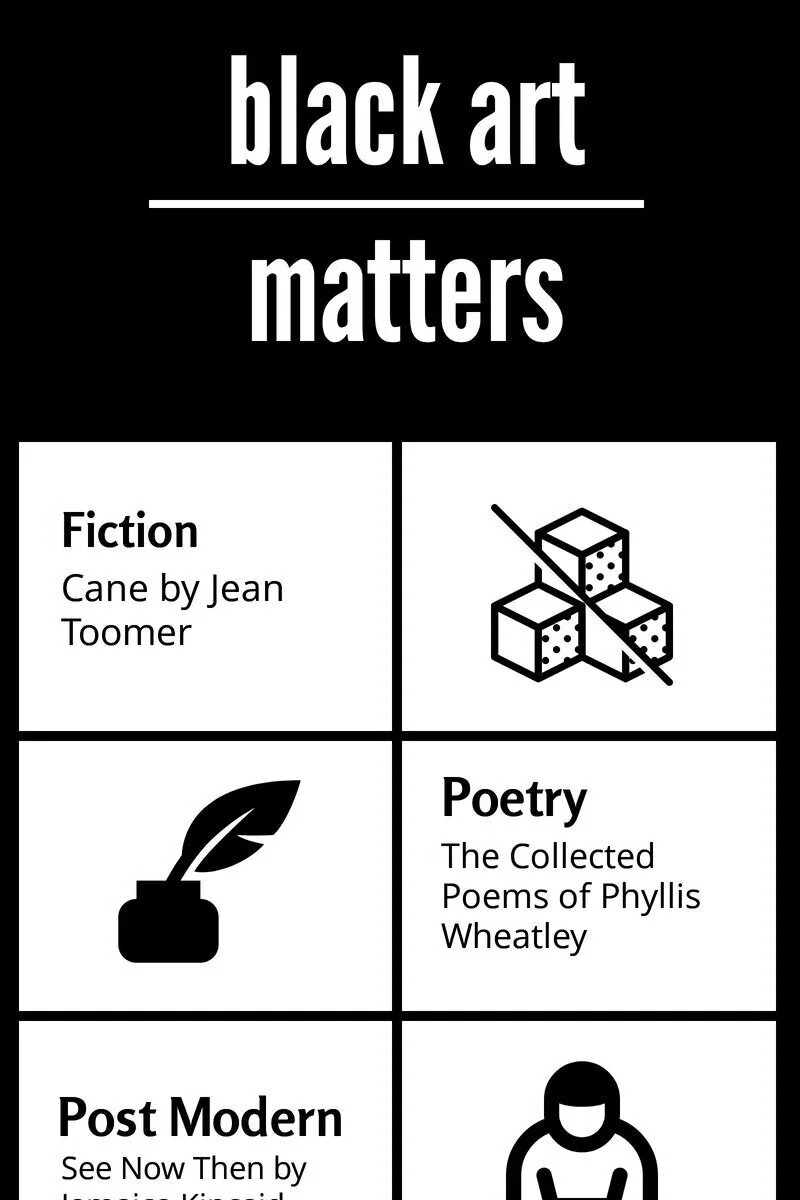Black Art Matters
In response to the current news, though I’ve publicly expressed support for protesters fighting in the anti-racist movement/revolution, I’ve tried to limit my voice in order to allow other more needed, relevant, and prominent voices to take precedence. This is due to my belief that others have more, better things to voice on the limited newsfeed space the algorithms provide, and a long-held, personal habit of getting completely out of the way in such cases, for better or worse. Among the myriad calls for people to educate themselves, however, I do feel that I have something to offer that might be useful: a reading list, or something of one.
I’ve compiled here a list of art (text and lyric both) from Black creators that has been formative for me over the last few years. Here’s a brief line about each choice and a couple of honorable mentions in case you’re moved to engage with something on this list.
Cane by Jean Toomer
A prose/poetry mashup from the early 20th century, highlighting the experience of enslaved people who harvested sugar cane. This work was particularly brutal—the life expectancy for many of those who were sent to cane plantations was only a few years. The violence of this work stemmed from both the plants, which cut and bruised the harvesters, and the plantation owners, who treated their workers as utterly disposable. It was the enslaved people of Haiti, almost all sugar cane harvesters, who fought and won the first successful revolution in the so-called “new world”—not the United States.
The Collected Poems of Phyllis Wheatley
Wheatley is the first published Black female author and released her first collection while enslaved, becoming simultaneously the third, published, American woman. She began writing poetry at the age of 13. It’s worth looking up a brief biography of her, even if you aren’t interested in poetry. Her story is complicated and rather beautiful.
See Now Then by Jamaica Kincaid
A moving, highly lyrical, and decentering piece about divorce and depression, this work of fiction is the perfect choice for times of loss. Some critics said this book would’ve been better left in a drawer and called it an indulgent personal journal on Kincaid’s divorce. Kincaid denies this text is related to her divorce, and I say the critics couldn’t be more off base about the value of the book. Kincaid currently teaches at Harvard where she is the Professor of African and African American Studies in Residence.
Street Scene by Kurt Weill and Langston Hughes drawn from the play of the same name by Elmer Price:
If you’ve studied even the tiniest bit of music history, you might recall that George Gershwin wrote the first “Black” opera: Porgy and Bess. That fact is a load of hogwash. Here’s Langston Hughes’ libretto combined with jazz music and inspired by Weill and Hughes’ frequent visits to 1940s Harlem. It’s, unsurprisingly, underperformed today, but you can find a recording and more info here if you’re curious.
Cécile McLorin Salvant
A 30-yr-old jazz vocalist who might be my favorite singer of all time. She performs works by Weill and Hughes, among many others. It’s worth listening to her interviews too, she has a lot to say about the motivations behind her repertoire choices.
Still More
I couldn’t leave this post without referencing two honorable mentions. They were wildly formative to me in my attempts to listen closely to Black voices but are either already spoken about broadly or not by a Black author. Citizen: An American Lyric by Claudia Rankine is a modern piece of mixed media (in book form) from the last decade that powerfully speaks to why we should change the way we look at race in America. Secret History by Leonora Sansay is an account in letters of a white woman’s experience of the Haitian revolution. Some of the writing is likely fictionalized, but I include it here because as a contemporary piece it was a huge help to me in understanding the history of the revolution.
Feel free to comment and keep adding to this list. While it’s incredibly important to read books that teach us about current issues, I’m especially interested in older literary and lyrical voices that deserve inclusion on this list or my personal reading list. Recommend away!


